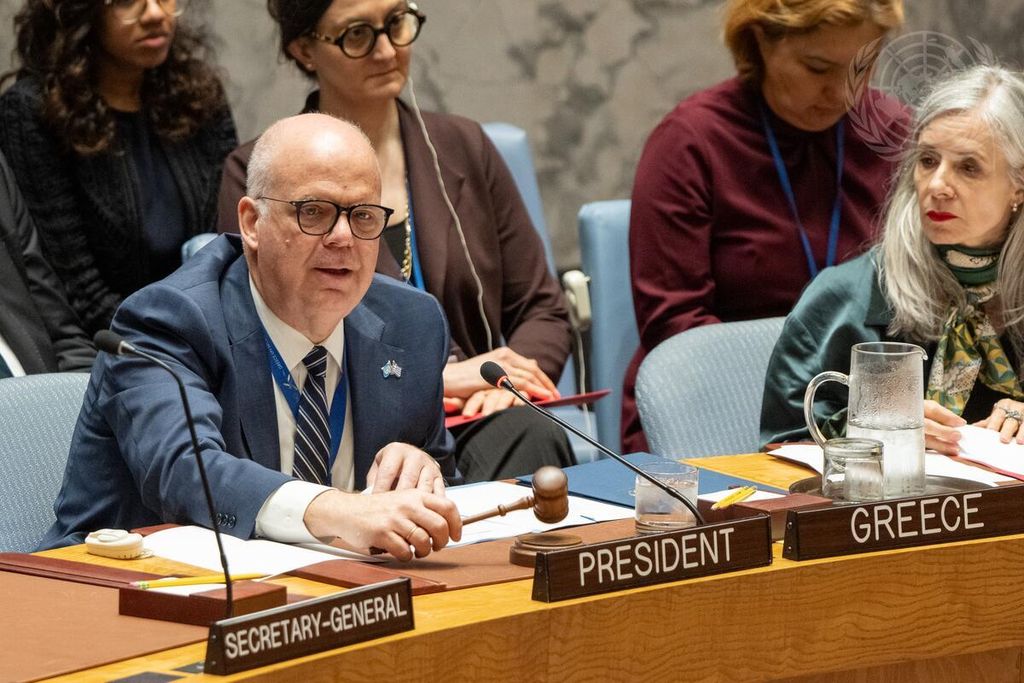13 May 2025
I wish to thank the USG for Humanitarian Affairs Mr. Tom Fletcher, and the Director of the FAO Office in New York, Ms. Jacome, for their briefings today.
Colleagues,
No humanitarian aid has reached the people of Gaza, in more than two months.
Their needs cannot wait; especially the needs of the most vulnerable groups, including children, at a time when the WFP’s food stocks are depleted and community kitchens continue to shut down.
Children are also in need of routine vaccinations – at a time when the danger of waterborne diseases and infections still lurks.
Water, sanitation and hygiene insecurity, the dysfunctionality or complete shutdown of healthcare clinics, the extremely limited access to fuel, as well as the increased number of robbery and looting incidents paint a bleak picture.
While the hostilities have regrettably resumed and the negotiations are continuing, the issue of the distribution of aid needs to be properly addressed.
We call for the safe, unconditional, massive and unhindered delivery of humanitarian aid at scale and to restore access to electricity and water.
Next steps should be determined based on dialogue and cooperation. The UN has repeatedly asserted its readiness to scale up the delivery of critical supplies and services once the blockade is lifted.
It is crucial, though, to ensure that any proposed scheme adheres to the core principles of the international humanitarian law, namely humanity, impartiality, independence and neutrality.
Furthermore, any plan should include all parts of Gaza, taking into account the needs of the less mobile and most vulnerable parts of the population; Its role should be complementary and supportive to the existing humanitarian operations within the Strip;
Last but not least, certain security standards should be applied, so as to avoid any further instability and prevent Hamas from continuing to instrumentalize humanitarian aid at the expense of the civilian population.
The protection of civilians and their unimpeded access to humanitarian aid and services must remain a non-negotiable, absolute principle at all times, as proclaimed by international law, and specifically by the Geneva Conventions.
The same principles apply to humanitarian workers, whose safety and security is jeopardized on a daily basis. Humanitarian operations continue to be subject to severe movement restrictions, military activity and attacks. These actions not only disrupt aid operations; they endanger the lives of aid workers.
Dear colleagues,
We join fellow member states in welcoming the release of Edan Alexander, yesterday. All hostages must be treated humanely and be released immediately and unconditionally. Members of the Security Council have been consistent and clear on this since the October 7 terrorist attacks perpetrated by Hamas, that Greece has repeatedly condemned.
The humanitarian situation in the rest of the Occupied Palestinian Territories is worsening as well. We are very concerned by the recent closure orders against 6 UNRWA schools in East Jerusalem, as well as over the continued attacks on schools sheltering displaced people, including the recent attack on an UNRWA school in Al Bureij, with dozens of people reportedly killed, including women and children.
Education is not a privilege; it is a basic human right and must be protected at all times.
UNRWA’s role remains pivotal and indispensable in this regard.
We also express concern over reports of continuous settler violence in the West Bank, where more than 40.000 people remain displaced, Palestinian-owned properties are demolished and seized; and settlement activity has significantly increased.
Colleagues,
We urge the parties to this conflict to make a sincere effort to negotiate and achieve a permanent ceasefire. We also reiterate our call for the immediate release of all hostages.
Our goal remains a Two-State solution, in accordance with the SC Resolutions, where Palestine and Israel can live in peace and security.
We repeat our position that the Arab plan for Gaza, as presented by Egypt, constitutes a good starting point towards planning reconstruction. Any day-after scenario should ensure the leading role of a reformed Palestinian Authority, and Hamas can have no role in the day after in Gaza and in the region, nor should it be in position to threaten Israel.
We commend Egypt and Qatar and the United States for their persistent mediation efforts. We are also looking forward to the upcoming June Conference, under the co-presidency of France and the Kingdom of Saudi Arabia, a potentially critical milestone in promoting the Two-State solution and enduring peace in the region.
After all, peace can only be achieved through dialogue, diplomacy and mutual understanding.
Thank you.


